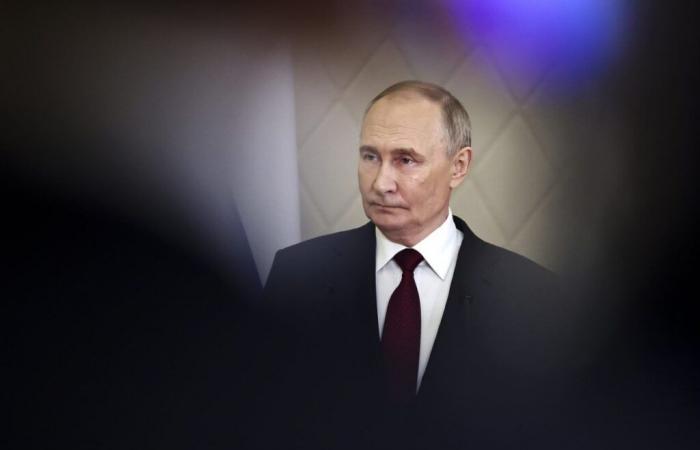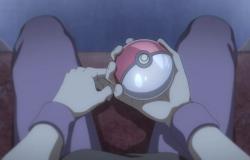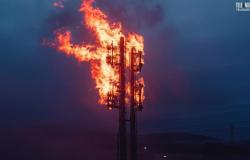In 2024, President Vladimir Putin strengthened his grip on power and sought to counter Russia’s isolation from the West, caused by the war in Ukraine. It has also faced persistent challenges, with a deadly attack by gunmen in Moscow and an incursion by Kyiv troops into its territory.
As the nearly 3-year war enters a potentially crucial new phase against the backdrop of a new US administration and its uncertain support for Kyiv, here’s a look back at how the year went for Mr Putin:
January: A presidential campaign without a real opponent
Mr. Putin ran for a fifth term while his main opponents were imprisoned or exiled abroad. In a rare challenge, thousands of Russians lined up in the January cold to sign petitions in support of an unlikely opponent. Boris Nadezhdin, a 60-year-old MP critical of the war, obtained the 100,000 signatures needed to run in the election. Electoral authorities ultimately blocked him from running. Yet the support he has received reflects antiwar sentiment and the public’s desire for political competition, which is an embarrassment for Mr. Putin.
February: Alexeï Navalny dies in prison
On February 16, Alexei Navalny, Vladimir Putin’s longtime foe, died in an Arctic penal colony while serving a 19-year sentence for charges widely considered politically motivated. The news of his death at the age of 47 shocked the world and deprived the Russian opposition of its most charismatic leader. No exact cause of death was given; his family and allies have blamed the Kremlin, which has denied any involvement. Tens of thousands of mourners attended his funeral in Moscow two weeks later in defiance.
March: Massacre at concert overshadows Mr Putin’s election victory
On March 17, Mr. Putin won his long-awaited electoral triumph, which will keep him in power until 2030. This came after the harshest crackdown on dissent since Soviet times. Five days later, gunmen stormed a concert hall in a Moscow suburb, killing more than 140 people and setting the venue on fire. An affiliate of the Islamic State group claimed responsibility for the attack, although the Kremlin, without evidence, tried to blame Ukraine for the deadliest attack on Russian soil in nearly two decades. The attack stunned the capital and revived memories of other attacks during the early years of Mr. Putin’s presidency.
June: Mr Putin visits North Korea to strengthen ties
Mr Putin made a two-day visit to North Korea in June – his first in 24 years – as the two countries deepen ties amid intensifying confrontations with Washington. The pact signed by Mr. Putin and North Korean leader Kim Jong Un provides for mutual military assistance if either country is attacked. The new deal marked their strongest bond since the end of the Cold War, adding to concerns in Washington and Seoul.
July: Journalist Evan Gershkovich convicted in trial denounced as a charade
Wall Street Journal reporter Evan Gershkovich, arrested in March 2023 and charged with espionage, was convicted and sentenced to 16 years in prison in a speedy trial. His employers and the U.S. government denounced the process as a charade and dismissed the accusations as fabricated. Without presenting evidence, authorities claimed he was collecting secret information for the United States. Mr. Gershkovich, the American son of Soviet immigrants, was the first Western reporter arrested on espionage charges in post-Soviet Russia.
August: Mass prisoner exchange and Ukraine push into Kursk
On August 1, Washington and Moscow carried out the largest East-West prisoner exchange in post-Soviet history. Among those released were Mr. Gershkovich and fellow American Paul Whelan, as well as prominent Russian dissidents, such as Vladimir Kara-Murza and Ilya Yashin. The multinational agreement made it possible to free around twenty people, including Vadim Krasikov, sentenced to life in prison in Germany for killing a former Chechen activist in Berlin.
Also in August, Ukraine launched a surprise incursion into Russia’s Kursk region, the largest cross-border raid by Kyiv’s forces. The event exposed Russia’s vulnerabilities and dealt an embarrassing blow to the Kremlin, with tens of thousands of civilians fleeing the region. With the bulk of the Russian army engaged in eastern Ukraine, few troops remained to protect the Kursk region. Russian forces have since regained control of part of the territory, but have not yet succeeded in completely dislodging troops from Kyiv.
September: Mr Putin visits Mongolia without fear of arrest
Mr. Putin visited Mongolia, a regional ally, in a move widely seen as an attempt to counter Western efforts to isolate it. Mongolia is among countries that have ratified a treaty establishing the International Criminal Court, which in 2023 issued an arrest warrant for Mr. Putin for alleged war crimes in Ukraine. Mongolia ignored calls for the Russian leader’s arrest and gave him a red carpet welcome, with the two countries signing deals on energy supplies and modernization of power plants.
October: US says North Korean troops are in Russia
In October, the Pentagon announced that North Korea had sent about 10,000 troops to Russia to take part in the fighting against Ukraine – a move that Western leaders say will escalate the war and shake up relations in Asia. Moscow and Pyongyang have remained silent on the deployment allegations.
Mr. Putin also hosted a summit of the BRICS bloc of nations, attended by the leaders or representatives of 36 countries, in what many saw as evidence of the failure of U.S.-led efforts to isolate Russia.
November: Trump victory and deadly new Russian missile
Former President Donald Trump won another term in the White House in November, raising concerns that his administration could reduce military support for Ukraine and force it to negotiate with Moscow. Current President Joe Biden has authorized Kyiv to use long-range weapons supplied by the United States for deeper strikes on Russian soil.
Russia responded by firing a new intermediate-range hypersonic ballistic missile – called Oreshnik – at a town in central Ukraine. Mr. Putin boasted that the missile could not be intercepted by air defenses. He warned that Moscow could use it for further strikes against Ukraine and also potentially to hit military installations of NATO countries providing military support to Ukraine.
December: An ally falls, a bomb rocks Moscow and a plane crash prompts an apology
Syrian leader Bashar al-Assad’s government collapsed after a lightning offensive by rebels. Mr. Putin granted asylum to Mr. Assad, a longtime Moscow ally, and his family. The Kremlin’s failure to prevent its fall nine years after its military intervention to support its rule revealed the limits of Russia’s power and tainted its international influence at a crucial moment in its war in Ukraine.
Then, an embarrassing attack brought war back to the streets of Moscow. Lieutenant General Igor Kirillov, head of Russia’s radiation, biological and chemical protection forces, was killed alongside one of his aides by a bomb placed outside his building. Mr Putin described Mr Kirillov’s killing as a “major mistake” by security agencies.
On the last weekend of the year, Mr. Putin apologized for what he said was a “tragic incident” in Russian airspace. This concerns the December 25 crash of an Azerbaijani airliner which killed 38 people in neighboring Kazakhstan. His statement came amid mounting allegations that the plane was shot down by Russian air defenses trying to stop a Ukrainian drone attack near Grozny, Chechnya. While Russian officials have acknowledged that the air defense systems were at work, Mr. Putin’s apology to the Azerbaijani leader does not go so far as to say that Moscow takes responsibility.






